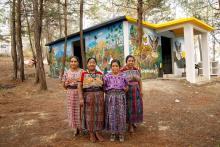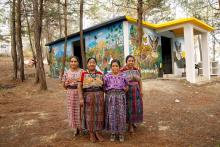
The preservation and transmission of traditional knowledge is the theme of this year’s commemoration of the International Day of the World’s Indigenous Peoples. It is an opportunity to celebrate indigenous women’s rich knowledge about the natural world, health, technologies, distinct rites and rituals, and other significant cultural expressions. Generation after generation, women pass on this traditional knowledge, which is a precious inheritance.
Statement: Indigenous women play a vital role in the preservation and transmission of traditional knowledge
Indigenous artists from San Juan Comalapa, Guatemala, pause painting work and stand for a photo in front of the “Centre for the Historical Memory of Women”, Apri 2018. Pictured from left to right: María Nicolasa Chex, Rosalina Tuyuc Velásquez, Paula Nicho Cumez, and María Elena Curruchiche. Photo: UN Women/Ryan Brown.
Despite strong international commitments to the preservation and protection of traditional knowledge, practices and creativity, there is continued exploitation of indigenous peoples and their resources. In some countries, those resources, including sacred objects, are threatened, used, or patented for commercial purposes without permission.
Protection of traditional knowledge can be especially challenging. This is the case when it concerns indigenous women’s roles to produce, safeguard, and maintain fragile resources, such as their languages. Indigenous women’s voices therefore need to be heard more clearly in the development of policies on cultural heritage and cultural expression.
Measures to be taken should include the establishment of specific legal regimes to ensure that indigenous women are able to benefit from their own knowledge, prevent its unlawful use by others, and have it rightfully recognized internationally. An environment that encourages individuals and social groups, especially indigenous women, to create, produce, disseminate, distribute, and have access to their own cultural expressions should be created. Indigenous women should meaningfully participate in decision-making on how their heritage is used, maintained, and managed.
In March this year, the Commission on the Status of Women encouraged Member States to ensure that the perspectives of all indigenous and rural women and girls are taken into account, with their full and equal participation in the design, implementation, follow-up to, and evaluation of policies and activities that affect their livelihoods, well-being, and resilience.
UN Women recognizes the potential of the traditional knowledge held by indigenous women to eradicate poverty, enhance sustainable development, food security and biodiversity. We are committed to work with indigenous women from around the world to ensure that their rights, voices, and experiences are protected and amplified, and to promote their contributions to the advancement of the 2030 Agenda for Sustainable Development.
Topics
- 2030 Agenda for Sustainable Development
- Indigenous women
- Decision-making
- Governance and national planning
- Human rights
- Leadership and political participation
Related content
